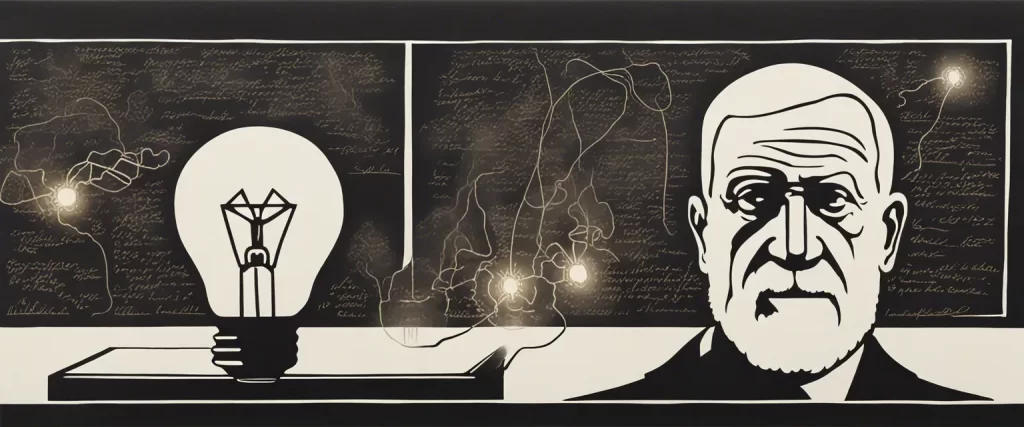Unraveling the Depths of Psychology: A Guide to Freud by Peter Gay

In a world filled with endless puzzles to unravel, the human mind remains one of the most enigmatic enigmas. As we strive to understand the depths of our thoughts, desires, and behaviors, one name continually emerges in the annals of psychology: Sigmund Freud. Regarded as the father of psychoanalysis, Freud’s groundbreaking theories have captivated both the curious and the skeptical alike. In his critically acclaimed book “Freud,” Peter Gay delves into the life and work of this towering figure, offering invaluable insights into the realm of psychology. Join us on an exploratory journey as we unravel the layers of Freud’s intricate ideas and their lasting impact on our understanding of the human psyche.
What is Psychology
Psychology is the scientific study of the human mind and behavior. It encompasses the understanding of individual and group behavior, mental processes, emotions, thoughts, motivations, and social interactions. In other words, psychology seeks to explain why people think, feel, and act the way they do. It involves various field of study, such as cognitive psychology, developmental psychology, social psychology, clinical psychology, and many more. Psychologists often conduct research, perform experiments, and apply various theories and approaches to understand and explain different psychological phenomena. The knowledge gained from psychology is used in a wide range of areas, including healthcare, education, business, and therapy to improve human well-being and increase our understanding of the human experience.
Why is Psychology Important to Us
Psychology is important to us for several reasons:
1. Understanding human behavior: Psychology helps us understand why people behave the way they do. It explores various aspects of human behavior including emotions, cognition, personality, and social interactions. This knowledge allows us to have a better understanding of ourselves and others, leading to healthier relationships and improved communication.
2. Mental health and well-being: Psychology plays a crucial role in addressing mental health issues and promoting overall well-being. It helps identify and understand mental disorders, provides effective treatment options, and offers strategies to maintain good mental health. Psychological interventions such as therapy and counseling are instrumental in helping individuals overcome challenges and lead fulfilling lives.
3. Improved decision-making: Psychology provides insights into the decision-making process. It explores cognitive biases, heuristics, and logical reasoning, allowing us to make decisions based on accurate information rather than relying on faulty thinking patterns. Understanding how our minds work can help us make better decisions in various domains of life, including personal relationships, education, career choices, and financial matters.
4. Behavior change and self-improvement: Psychology helps us understand the factors that influence our behavior and provides strategies to facilitate behavior change. By knowing how habits are formed, how motivation works, and how to set achievable goals, individuals can make positive changes in their lives. Psychology also helps in developing self-awareness, promoting personal growth, and fostering resilience in the face of adversity.
5. Social and organizational dynamics: Psychology sheds light on social influences, group dynamics, and organizational behavior. It helps us understand how individuals interact within groups, how attitudes are formed, and how norms and conformity influence behavior. This knowledge is valuable in fields such as leadership, teamwork, marketing, and human resource management.
Overall, psychology is important to us as it enhances our understanding of human behavior, promotes mental health, improves decision-making, facilitates behavior change, and provides insights into social and organizational dynamics.
Unlocking Psychology from Freud

Freud Introduction
Freud: A Life for Our Time” is a biography of Sigmund Freud written by Peter Gay. The book provides a comprehensive overview of Freud’s life, his groundbreaking theories, and his influence on modern psychology.
Peter Gay delves into the personal life of Sigmund Freud, shedding light on his childhood, education, and early career. The book explores how Freud’s own experiences and struggles influenced his developing theories on the human mind, including his famous concepts of the unconscious, infantile sexuality, and the Oedipus complex. Gay presents a nuanced portrait of Freud, discussing his various relationships, family dynamics, and his enduring collaboration with influential figures such as Carl Jung and Wilhelm Fliess.
The biography also delves into the historical and cultural context in which Freud lived and worked. It examines the challenges Freud faced in establishing psychoanalysis as a legitimate field of study, as well as the controversies and criticisms his ideas provoked. Additionally, the book explores the impact of Freud’s work on society, including his contributions to the understanding of dreams, his therapeutic techniques, and his exploration of the relationship between sex and psychology.
Throughout the biography, Peter Gay provides thoughtful analysis and interpretation of Freud’s theories, highlighting their significance and examining their enduring relevance in modern times. He presents Freud as a complex figure who revolutionized the field of psychology and forever changed our understanding of the human mind.
In summary, “Freud: A Life for Our Time” offers a comprehensive and engaging biography of Sigmund Freud, exploring his personal life, his theories, and his enduring impact on the field of psychology.
Psychology Methods
In the book “Freud: A Life for Our Time” by Peter Gay, various psychological methods developed by Sigmund Freud, the founder of psychoanalysis, are discussed. Some of the key methods mentioned in the book include:
1. Free Association: This method involves encouraging patients to freely talk about their thoughts, feelings, and memories without censoring their speech. The aim is to explore unconscious aspects of the mind and identify repressed or traumatic experiences.
2. Dream Analysis: Freud believed that dreams provide insight into unconscious desires and conflicts. He utilized dream analysis to interpret symbolic meanings behind dream content and link them to underlying wishes or repressions.
3. Psychosexual Stages: Freud proposed that human development progresses through distinct psychosexual stages, including oral, anal, phallic, latency, and genital stages. This concept emphasizes the links between sexual development and personality formation.
4. Transference: This concept involves the patient transferring feelings and emotions onto the therapist that are derived from previous relationships, typically with parental figures. By analyzing transference, Freud aimed to bring repressed emotions and conflicts to the surface.
5. Interpretation of Symbols and Language: Freud believed that symbols, jokes, parapraxes, and linguistic expressions provide insights into the unconscious mind. He placed great importance on interpreting these symbolic elements to uncover hidden meanings and repressed desires.
6. Analysis of Resistance: Resistance refers to the patient’s reluctance or difficulty in exploring certain thoughts, memories, or emotions during therapy. Freud considered resistance as a defense mechanism against repressed material, and he analyzed it to understand underlying conflicts.
7. The Oedipus Complex: One of Freud’s most famous theories, the Oedipus complex describes the unconscious sexual desire that a child develops for their opposite-sex parent, along with feelings of rivalry or hostility towards the same-sex parent. Freud argued that this complex significantly impacts personality development.
8. Catharsis: Freud emphasized the importance of emotional release or catharsis in therapy. He believed that verbalizing and experiencing repressed emotions could provide relief and promote psychological healing.
These are some of the main psychological methods introduced and discussed in the book “Freud: A Life for Our Time” by Peter Gay.
Freud Quotes
Freud quotes as follows:
1. “The interpretation of dreams is the royal road to a knowledge of the unconscious activities of the mind.”
2. “The ego is not master in its own house.”
3. “Time spent with cats is never wasted.”
4. “What we call happiness in the strictest sense comes from the (preferably sudden) satisfaction of needs which have been dammed up to a high degree.”
5. “One day, in retrospect, the years of struggle will strike you as the most beautiful.”
6. “Unexpressed emotions will never die. They are buried alive, and will come forth later in uglier ways.”
7. “The mind is like an iceberg; it floats with one-seventh of its bulk above water.”
8. “Where id was, there ego shall be.”
9. “The voice of the intellect is a soft one, but it does not rest until it has gained a hearing.”
10. “The first human who hurled an insult instead of a stone was the founder of civilization.”

More Books about Freud By Peter Gay
Book Recommendation: Exploring the Power of the Mind and Effective Communication
1. The Power of Your Subconscious Mind” by Joseph Murphy:
Joseph Murphy’s book explores the incredible potential of our minds and the influence our subconscious has on our daily lives. Offering practical techniques and exercises, this book helps readers tap into the power of their subconscious mind to achieve success and improve various aspects of life.
2. The Subtle Art of Not Giving a F*ck” by Mark Manson:
In this refreshing and honest book, Mark Manson challenges conventional positivity and self-help philosophies. He encourages readers to embrace their limitations, accept life’s uncertainties, and focus on what truly matters to find happiness and fulfillment in a world full of expectations and distractions.
3. “How to Talk to Anyone: 92 Little Tricks for Big Success in Relationships” by Leil Lowndes:
Communication skills are essential in both personal and professional relationships. Leil Lowndes provides practical tips, techniques, and strategies to improve conversational skills, build rapport, and make meaningful connections. This book is perfect for anyone looking to enhance their communication abilities and develop long-lasting relationships.
4. Influence: The Psychology of Persuasion” by Robert Cialdini:
Understanding the principles behind persuasion and influence is crucial in various aspects of life, including business, marketing, and personal relationships. Robert Cialdini’s renowned book explores the psychology behind persuasion, uncovering the hidden techniques others use to influence our decisions. It equips readers with the knowledge to navigate these strategies and defend against manipulation.
5. Mindset: The New Psychology of Success” by Carol S. Dweck:
Carol Dweck explores the impact of our mindset on success and happiness. The book distinguishes two mindsets: the fixed mindset, in which individuals believe their abilities and intelligence are fixed, and the growth mindset, which embraces the belief that abilities can be developed through effort and perseverance. Dweck’s work helps readers adopt a growth mindset, unlocking their full potential and fostering a love for learning and self-improvement.
These five books enable readers to embark on a profound exploration of the power of the mind, effective communication, personal growth, and success. Whether you’re seeking to enhance your relationships, communicate better, or unleash the potential of your subconscious mind, these recommendations will provide valuable insights and actionable strategies.


0 Comments